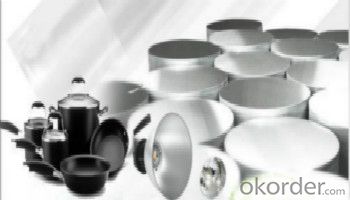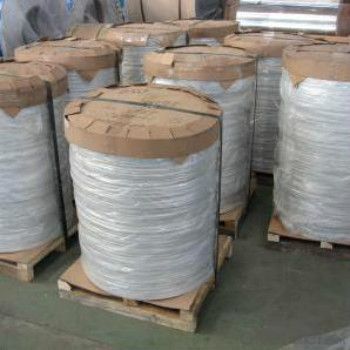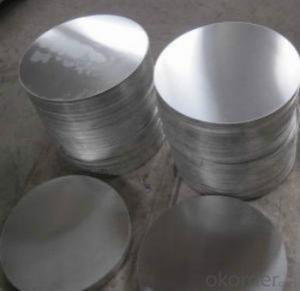Mill Finished Aluminium Circle for Basins
- Loading Port:
- Shanghai
- Payment Terms:
- TT OR LC
- Min Order Qty:
- 5 m.t.
- Supply Capability:
- 2000 m.t./month
OKorder Service Pledge
OKorder Financial Service
You Might Also Like
Item specifice
1. Structure of CC Aluminium in Coil Form for making Aluminium Circle Description
CC Aluminium in Coil Form for making Aluminium Circle is one semi-finished aluminium material. This coil can be rolled down to aluminium coil,sheet,circle ect. The alloy AA1050 is widly used in building, industry ect. Its weight is much lower than steel. So many customers choosed aluminium material instead of steel.
2. Feature of CC Aluminium in Coil Form for making Aluminium Circle
Surfact Quality :
Be free from Oil Stain, Dent, Inclusion, Scratches, Stain, Oxide Dicoloration, Breaks, Corrosion, Roll Marks, Dirt Streaks and other defect which will interfere with use,
Mechenical Property:
Chemical Composite and Mechanical Property
3. Image of CC Aluminium in Coil Form for making Aluminium Circle


4. Specification of CC Aluminium in Coil Form for making Aluminium Circle
Aluminum Coil/Sheet | |
Main Specification | |
Alloy | AA1xxx (AA1050, AA1060, AA1070, AA1100 etc.) |
AA3xxx (AA3003, AA3004, AA3005, AA3105 etc.) | |
AA5xxx, AA6XXX (AA5052,AA5083, AA5754, AA6061, AA6062 etc.) | |
AA8xxx(AA8011, AA8006 etc.) | |
Temper | H14,H16, H18, H22, H24, H26, H32,O/F, T4, T6, T651 |
Thickmess | 0.01mm-100mm |
Width | 30mm-1700mm |
Standard | GB/T 3880-2006/ASTM |
Special specification is available on customer's requirement | |
5. FAQ
1) What is the delivery time?
Depends on actual order, around 20 to 35 days
2) What is the QC system:
We have QC staff of 20 persons and advanced equipment, each production is with MTC traced from Aluminum ingot lot.
3) What market do you mainly sell to?
Australia, America, Asia, Middle East, Western Europe, Africa etc
4)What about payment term?
30% T/T in advance, balance against B/L COPY.
- Q:Just wondering if an aluminum and Fluoride bond can be created by boiling fluoridated water in aluminum cookware?
- i would say yes because ions are released from most things when heated
- Q:Aluminum roll 220 kg.0.3 thickness, 500 width, roll diameter is how much?
- You can use the outside diameter, the inner diameter and the width to get the volume. You know the density and volume, and then you can find the weight naturally
- Q:Are aluminum coils resistant to vibration?
- Aluminum coils, typically, exhibit resistance to vibrations. Being lightweight and flexible, aluminum possesses the capability to absorb vibrations and alleviate their effects. Moreover, aluminum coils find extensive usage in crucial areas where vibration resistance holds significance, such as HVAC systems, automotive components, and electrical transformers. The commendable strength-to-weight ratio of aluminum further contributes to its capacity to endure vibrations without distortion or fracturing. Nevertheless, the precise degree of vibration resistance could vary depending on the distinctive design and construction of the aluminum coil.
- Q:Can aluminum coils be used in high-altitude environments?
- Indeed, the utilization of aluminum coils is feasible in high-altitude settings. Thanks to its lightweight and resistance to corrosion, aluminum is a fitting material for various purposes, including in high-altitude scenarios. Aluminum coils are often employed in air conditioning systems, heat exchangers, and refrigeration units, all of which can operate efficiently at high altitudes. The high strength-to-weight ratio of aluminum enables it to endure the harsh conditions encountered at high altitudes, encompassing low temperatures, strong winds, and low atmospheric pressure. Moreover, aluminum is non-magnetic, providing an advantage in specific high-altitude applications like aerospace and satellite technologies. Additionally, aluminum exhibits exceptional thermal conductivity, facilitating efficient heat transfer and rendering it perfect for deployment in cooling systems functioning in high-altitude environments. Its resistance to corrosion also ensures durability and the ability to withstand the impact of moisture, which can be prevalent in such settings. All in all, owing to their lightweight nature, resistance to corrosion, thermal conductivity, and strength, aluminum coils serve as a dependable and appropriate choice for utilization in high-altitude environments.
- Q:Are aluminum coils suitable for electrical conductors?
- Aluminum coils, indeed, prove to be suitable for electrical conductors. Due to its remarkable electrical conductivity, aluminum has become a widely utilized material in the electrical industry. It possesses approximately 61% conductivity in comparison to copper, the utmost commonly employed metal for electrical conductors. Lightweight, cost-effective, and possessing good thermal conductivity, aluminum coils have become a favored selection for a range of electrical applications. Nonetheless, it is noteworthy that aluminum has a lower tensile strength than copper, thus potentially demanding a larger cross-sectional area to attain an equivalent level of current carrying capacity. Furthermore, to prevent oxidation and guarantee efficient electrical conductivity in aluminum coils, it is imperative to employ proper insulation and connectors.
- Q:What are the fire resistance properties of aluminum coils?
- Aluminum coils have excellent fire resistance properties due to the inherent characteristics of aluminum, such as its high melting point and low flammability. Aluminum does not burn, but instead forms a protective oxide layer on its surface when exposed to heat or flames. This oxide layer serves as a barrier, preventing further oxidation and combustion. Additionally, aluminum has a high thermal conductivity, which helps to dissipate heat quickly, further reducing the risk of fire. Overall, aluminum coils are considered to be highly resistant to fire.
- Q:Are aluminum coils suitable for cryogenic applications?
- No, aluminum coils are not suitable for cryogenic applications due to their low temperature brittleness and poor thermal conductivity.
- Q:Can aluminum coils be customized to specific requirements?
- Yes, aluminum coils can be customized to specific requirements. The customization process involves adjusting the dimensions, thickness, alloy composition, and surface finish of the coils to meet the specific needs of different industries and applications.
- Q:How are aluminum coils used in gutter systems?
- Gutter systems commonly incorporate aluminum coils due to their durability and resistance to corrosion. These coils enable the creation of seamless gutters that are custom-fitted to the specific dimensions of a structure, preventing water damage to the roof and foundation. To begin the process, an aluminum coil is fed through a specialized machine known as a gutter machine. This machine transforms the coil into a gutter shape, typically in a continuous length that can extend the entire length of the roofline without any seams. The coil is molded into a trough-like structure with a slight slope, facilitating the easy flow of water towards downspouts. Aluminum is an ideal material for gutter systems because it is lightweight yet robust, simplifying installation and minimizing the risk of sagging or bending. It is also highly resistant to rust and corrosion, ensuring the longevity of the gutter system even in harsh weather conditions. Additionally, aluminum can be easily painted or coated to match the aesthetic of the building. Once the seamless gutters are formed from the aluminum coil, they are typically secured to the roofline's edge using hangers or brackets. Downspouts are then affixed to strategic points on the gutters to redirect the collected rainwater away from the building's foundation. These downspouts can also be fashioned from aluminum coils, maintaining a seamless and cohesive appearance throughout the entire gutter system. In conclusion, aluminum coils are utilized in gutter systems to produce seamless gutters that offer effective and efficient water drainage. Their durability, resistance to corrosion, and ease of installation have contributed to their popularity in residential, commercial, and industrial buildings.
- Q:Are aluminum coils suitable for architectural façade systems?
- Yes, aluminum coils are suitable for architectural façade systems. Aluminum is a lightweight and durable material that offers excellent corrosion resistance and can be easily shaped and formed into various designs. It is widely used in architectural applications due to its versatility, strength, and aesthetic appeal. Additionally, aluminum coils can be coated with different finishes to enhance their appearance and provide protection against weathering, making them an ideal choice for architectural façade systems.
1. Manufacturer Overview |
|
|---|---|
| Location | |
| Year Established | |
| Annual Output Value | |
| Main Markets | |
| Company Certifications | |
2. Manufacturer Certificates |
|
|---|---|
| a) Certification Name | |
| Range | |
| Reference | |
| Validity Period | |
3. Manufacturer Capability |
|
|---|---|
| a)Trade Capacity | |
| Nearest Port | |
| Export Percentage | |
| No.of Employees in Trade Department | |
| Language Spoken: | |
| b)Factory Information | |
| Factory Size: | |
| No. of Production Lines | |
| Contract Manufacturing | |
| Product Price Range | |
Send your message to us
Mill Finished Aluminium Circle for Basins
- Loading Port:
- Shanghai
- Payment Terms:
- TT OR LC
- Min Order Qty:
- 5 m.t.
- Supply Capability:
- 2000 m.t./month
OKorder Service Pledge
OKorder Financial Service
Similar products
New products
Hot products
Related keywords





























